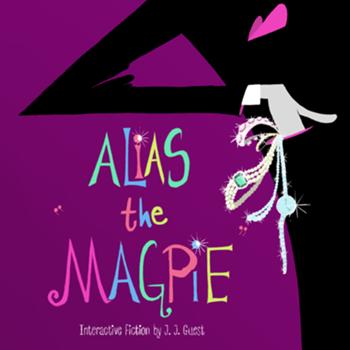 Alias ‘The Magpie’ is a parser comedy in which you’re a gentleman jewel thief who has infiltrated a country manor.
Alias ‘The Magpie’ is a parser comedy in which you’re a gentleman jewel thief who has infiltrated a country manor.
For some reason I was expecting a Wodehousian comedy; the time period feels about right for that, although the game carefully avoids leaving any definite clues about the date. It’s riffing on locked-room manor mysteries; the detective you’re impersonating is a ringer for Poirot. And this gag is so extremely Peter Wimsey that it almost feels like a lift:
“Ah! The brother of the countess. Interesting, I thought you would be younger.”
“Younger than what?”
“Younger than you are, Monsieur.”
“Odd thing to say. One can’t very well be younger than one is.”
But the cover art should be a clue here: overall the tone is much closer to the 60s, and in particular The Pink Panther. It’s goofy and slapstick, and spends a good amount of time poking fun at genre tropes – the library of its country house has been the scene of so many murders that the chalk outlines haven’t entirely faded. There is a good deal of absurd coincidence, arranged in ways which are quite satisfying. A lot of the fun is about how the protagonist is introduced as a suave, debonair mastermind who performs elegant, whisper-smooth, gentlemanly thefts, but the action involves causing an enormous amount of chaos and destruction and avoiding the blame for it only through sheer luck and the obtuseness of your marks, plus a lot of silly disguises.
As far as the environment goes, it does a fine job of cramming in a sense of lavish Victorian decorative excess without overburdening the text. That’s true of the writing in general: it’s ornate without being stodgy, and there’s always something interesting going on with it. It’s not always the most scintillatingly beautiful prose in the world, but it’s always got something that it’s excited about and really wants to show you, and it does have some really good lines. It’s writing that works as reward.
All this went a long way towards holding my interest in a game that has a good-sized map and doesn’t channel you very strongly at the beginning. Also helpful here: the sense of the place being alive. This is very much an inhabited space, and the people inhabiting it are active – not that there’s a hugely complex NPC-movement system or anything, but the density of simple triggered events on your arrival goes a long way.
He bounds out of the room with the energy of a small child and tears off across the great hall.
That line delighted me – and the story has that same kind of energy about it.
The puzzle design is pretty good. None of the puzzles are very complex, and a lot of them are pointed out very well; quite often you try the obvious thing and it works better than you hoped. (‘It worked, but it went rather further than you expected’ is a great device for caper plots.) There are one or two where the wording or actions required are a little over-precise, and some more rigorous testing around close-but-not-quite-right attempts might have helped; breaking the cucumber frame, in particular.
It’s a decidedly light piece: it’s not attempting to say anything very much about the subjects or genres it touches on, and its characters are jokes more than they are people. It does rely to a certain extent on the simple, honest pleasure of going through the very tasteless home of a very rich person and smashing everything.
This is in 7-8 territory: good fun, executed with a great deal of craft, does what it sets out to do. It doesn’t do better because it feels very safe; it’s not really trying to explore anything unexpected or difficult, either mechanically or thematically.
